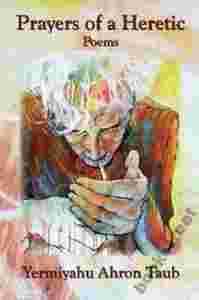|
Prayers of a Heretic explores the "crime" of heresy and the condition of existential displacement through the language of prayer and prayerful voice/s. In the first section, "Visits and Visitations," the poet imagines a variety of protoganists in situations of supplication. The second section, "In the Gleaning," examines the life, trangressions, and prayers of the title character and the primacy of books, libraries, and reading for refuge and reconfiguration. Eschewing a secular/religious divide, the book offers an expansive interpretation of the enduring power of prayer. Four poems also have a Yiddish version.
——
A hiss. An incantation. Fevered kisses. The heretical. In Prayers of a Heretic, Yermiyahu Ahron Taub sings of the daily, domestic, of the fleshy and the mortal. Listen to these words—dirge, meditation, celebration. Through them, Taub brings us closer to being human and to the divine.
—Julie R. Enszer, author of Handmade Love
Piety has a bad name these days. But in these lyrical wrestlings with the flesh and the spirit, Yermiyahu Ahron Taub reminds us that the pious are often the most passionate, and the heretics often the most holy.
—Dr. Jay Michaelson, author of Another Word for Sky: Poems
Taub is a master of the character study. His poems are crowded with portraits, novels in miniature, of the old, the overlooked, the dispossessed. Here you will find Aunt Milkah Pesl, taciturn and unsentimental, the volunteer in assisted living who reads books in Yiddish, the patient in an MRI scanner listening to "a symphony of terror" like "John Zorn on Quaaludes." There are the regulars in a library, and the treasures found hidden in the pages of old books. There are lonely men in search of "fleshly glory." And over-arching all, there are repentance and atonement, constantly remade anew.
—Kim Roberts, author of Pearl Poetry Prize-winning Animal Magnetism
This book is a feast: sensuous, ironic, political, hilarious, poignant and wise. Intimately Jewish yet embracing of all, its cast of characters includes aged professors, flirtatious landladies, poem-peddlers and the Pied Piper. In "Credo," a stunning poem near the book's end, Taub powerfully defines religion on his own terms, with equal measures of awe, horror and gratitude at the world.
—Ruth L. Schwartz, author of Edgewater
Whether he's writing in English or Yiddish, in poetry or prayer, Yermiyahu Ahron Taub has a firm grasp on the language of the heart. His characters, men (including one named Yermiyahu) and women whose only crimes are that they are human, are as familiar as our own reflections. In Taub's skilled and attentive hands, no judgments are passed; heresy is in the eye of the beholder.
—Gregg Shapiro, author of GREGG SHAPIRO: 77 and Protection
Prayers of a Heretic chronicles the physical and spiritual dimensions on which life itself depends. In a word: shelter. When observed by a poet with Taub's skill and generosity, the acts of seeking, erecting and sustaining shelter become memorably praiseworthy. Readers will be moved by much in this collection, including the sleeping homeless woman in the library "who surely traversed the city in storm and sun"; and the unnamed schoolchildren, "united by navy blue knee socks," carefully educated at a religious school ("the palace of certainty shielding the unknowable"). We aver what Taub avers: "there is no time assigned for prayer the sanctuary never closes."
—Kevin Simmonds, author of Mad for Meat
|

